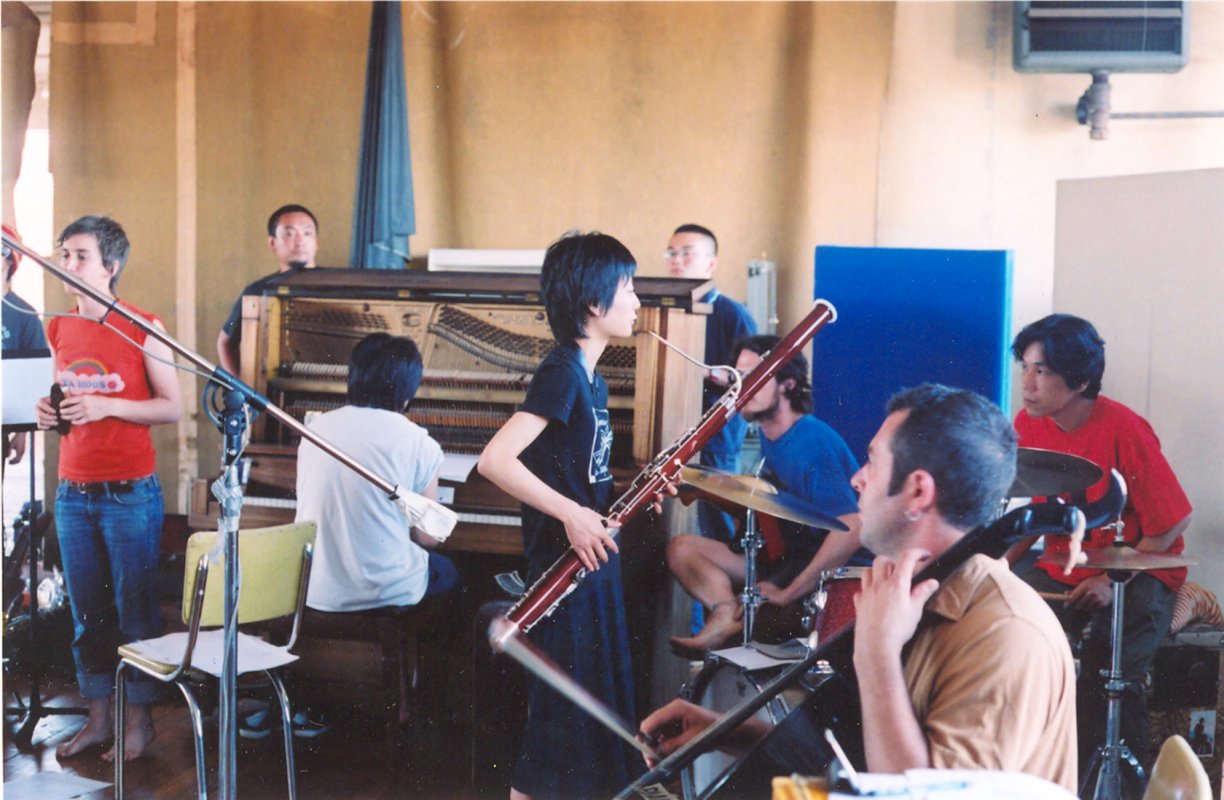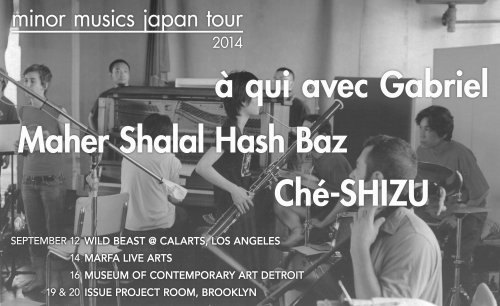Maher Shalal Hash Baz is a project of guitarist and songwriter Tori Kudo— avowed naïvist and anti-nuclear activist. A fluid large ensemble of untrained musicians, Maher Shalal Hash Baz create arresting indie-pop rich in wind voices and dissonant, enchanting melodies. Accordionist and vocalist à qui avec Gabriel crosses the border between pop field and avant-garde flexibly, with stark, ethereal songforms steeped in nostalgia and the sounds of European folk music.
Minor Musics Japan Tour 2014 comes to four American cities this September featuring performances by venerated artists of Japan's musical underground: Ché-SHIZU, Maher Shalal Hash Baz and à qui avec Gabriel. Organized by Brooklyn's ISSUE Project Room in collaboration with Wild Beast at CALARTS, Marfa Live Arts, and the Museum of Contemporary Art Detroit, this landmark tour touches the fringes of rock and pop with a naivist bent, crossing folk, improvisation, and a gleeful embrace of the unpolished.
Maher Shalal Hash Baz is the artistic alter ego of Tori Kudo, a Japanese composer and musician who formerly worked with Chie Mukai and Che-SHIZU. The group’s name comes from the Old Testament Book of Isaiah, and means "Hurrying to the spoil, he has made haste to the plunder." Maher Shalal Hash Baz formed when Kudo met euphonium player Hiroo Nakazaki, revealing a shared interest in the music of Mayo Thompson and Syd Barrett. The core trio consists of Tori on guitar and vocals, his wife and longtime musical collaborator Reiko Kudo as vocalist, and Nakazaki on euphonium, though the lineup has always been fluid. After a couple of self-released cassette albums, the Japanese Org label released Maher Goes To Gothic Country (1991) and the 83-track box set Return Visit to Rock Mass (1996). The group's profile expanded outside Japan when Stephen McRobbie of The Pastels signed them to his Geographic label. They have released two albums on Geographic: the compilation From a Summer to Another Summer (An Egypt to Another Egypt) (2000) and the 41-track Blues Du Jour (2003); plus a number of EPs on various labels. Kudo resists defining his gleeful, intense, naive music, which frequently features large ensembles of untrained musicians that embrace error, structure, and structurelessness.
This performance features Tori Kudo, vocals & guitar; Teruki Tamayanagi, percussion & clarinet; Yumi Ozaki, percussion; Mako Hasegawa, bassoon; Shun Noami, bass; Naoki Otani, trumpet; Kenji Kubota, guitar; Aiko Kubota, percussion; Momoko Maejima, keyboard; Arrington de Dionyso, sax; Zach Phillips and friends, bass & guitar; Sakiko Mori, keyboard; Malinda Allen, dance.
à qui avec Gabriel is a Japanese accordionist and vocalist. "à qui," derived from her name, Aki, is the player, with Gabriel: her trusty accordion. à qui takes a different approach than the some of the avant-gardists, including Keiji Haino and Makoto Kawabata, who grace her albums— she gravitates toward stark, ethereal sounds and whispering melodies rather than imposing dissonance and chaos. Her stylistic palette is eclectic, drawing in shades of jaunty European folk music, the elegant minimalism of Erik Satie, and uniquely lighthearted melancholia. à qui punctuates her solo performance with meaningful silence, emphasizing the humility of the lone performer. Her debut album, Utsuho was released in 2001 on John Zorn’s Tzadik label. On her most recent solo album, 2010’s Itsukushimi no Ame no naka de, (Musik Atlach) she flexibly moves between pop and avant-garde sensibilities with a focused, nostalgic energy. Her following albums on Musik Atlach have found her in collaboration with varied, complementary partners including the psychedelic rock trio Majutsu no Niwa on 第五作品集Ⅱ (Fifth Works II, 2012), and Makoto Kawabata, leader of the legendary psychedelia unit Acid Mothers Temple, on Golden Tree (2012) and Ame no Tsurugi (2013). à qui also formed the trio Pneuma Hectopascal in 2004.




